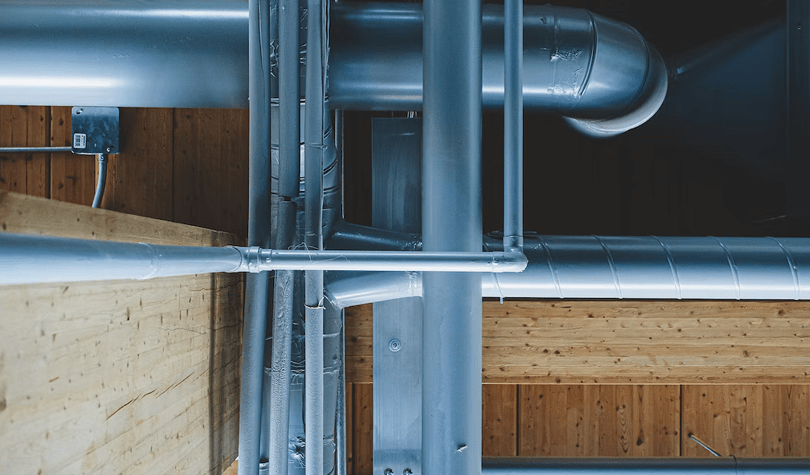We are all aware that our planet is fighting valiantly against major shifts in the global climate. Till we make things right with the environment, we have to deal with issues such as extreme weather conditions: colder winters and warmer summers.
As we step into the last stretches of fall, this is the perfect time to start preparing for the winter. Clean up your air filters and catch up on your furnace maintenance, but also focus on something that you may be overlooking: preventive care of your water pipes.
Why Do You Need To Pay Attention To The Water Pipes?
In winters, the extreme cold can make the water in the pipes freeze solid. Frozen water has a tendency to expand. As more and more water turns into solid and begins to expand, it applies a tremendous amount of pressure on water pipes — metal and plastic — and causes them to explode.
Image Source: unsplash/Sigmund
As you can imagine, frozen or burst water pipes are an issue for all the obvious reasons:
- Extensive repairs
- High cost of the repairs
- Water damage
- Disrupted supply of hot water
- Mold
- And others.
How To Prevent Pipes From Freezing?
Exposed water pipes are at the highest risk of freezing from cold impact. Spaces such as garages, basements, and attics are usually not fully insulated, leaving the pipelines in these areas to be at risk of frost damage.
To prevent such a thing from happening, here is a list of recommendations from our HVAC professionals to prevent your pipes from freezing in the winter, and what to do to thaw said pipes.
- Buy pipe insulation materials from your local hardware store and with a bit of DIY help, insulate your pipes against subzero temperatures.
- Keep garage doors closed to keep the warm air in and provide protection to the pipes.
- Keep your thermostat at the same temperature during the night as it was in the day. If you don’t, colder nighttime temperatures can set the pipes to freeze.
- Open your kitchen cabinet doors at nighttime to let the warm air circulate. Remove the chemicals away from the reach of children when you open your cabinets.
- Let a faucet drip cold water in the sink. A lazy dribble will maintain a steady flow of water in your pipes, ensuring they don’t freeze over and burst. When choosing the faucet for the job, pick one that is at the end of your pipeline. For example, if your pipeline starts from the back, choose the faucet that’s at the end of that line. This will keep the water flowing through the entirety of the pipes and won’t affect your water bill too much.
Freeze Prevention Tips For Long Absences
If your home is going to be vacant during the winters, even for a few days or weeks, there are steps to make sure you won’t have any water damage at your hands when you get back.
Here are some starting points to think of:
● Keep The Heat On
Do not shut off the heat when you go. Set your thermostat to no lower than 55 degrees to keep warm air flowing throughout the house. Sure, it’ll incur some heating bill even in your absence but that’s a small cost to pay compared to colossal repair expenses of burst water pipes, mold, or water damage.
● Open The Doors Inside
This will also aid the circulation of warm air inside your empty house. Also, open the garage door that you access from the inside as well as all the cabinets in the kitchen to let the warm air go to the areas that usually do not get a lot of heat.
● Drain All The Pipes
Before you leave, make sure to drain all the water from your pipes — indoors and outdoors. Shut off the main water supply and store all hoses inside the house. Empty your sprinklers as well as the pool and cover it too.
How To Thaw Frozen Pipes?
A clear indication of a frozen water pipe is when you turn on the faucet, only a trickle comes out. Once you locate the site where the pipe has been frozen, here are a few things you can do.
● Check If The Pipes Have Burst
Not all frozen pipes burst but you need to make sure you are in the clear before you start the thawing process. Otherwise, the resulting flow of water can cause serious amounts of water damage around your house, spiking your repair costs.
● Open The Faucet
Before you start treating the frozen pipes, make sure to open the tap so when ice starts to melt, the water has room to run through the pipe, melting the rest of the ice along the way.
● Apply Heat To The Pipes
Now, start the thawing treatment. Dip wash clothes in hot water and wrap them around the frozen pipes. You can do it with plastic as well as metal pipes. But with plastic, make sure the clothes are not too warm. You can also use electric heating pads or electric hair dryers for the job. But stay away from blow torches, propane or kerosene heaters, and other flammable materials.
When To Call An Expert?
When you can’t locate the site of the issue, the pipes have burst, or the water damage has affected your HVAC units or the water heater, it’s time to call in the specialists. AAC have been the go-to HVAC specialists in PA and Furnace Maintenance NJ expert for many years now and we come prepared to fix any issues in a single visit. Give us a call at 267-471-9323 or send us a service request.



